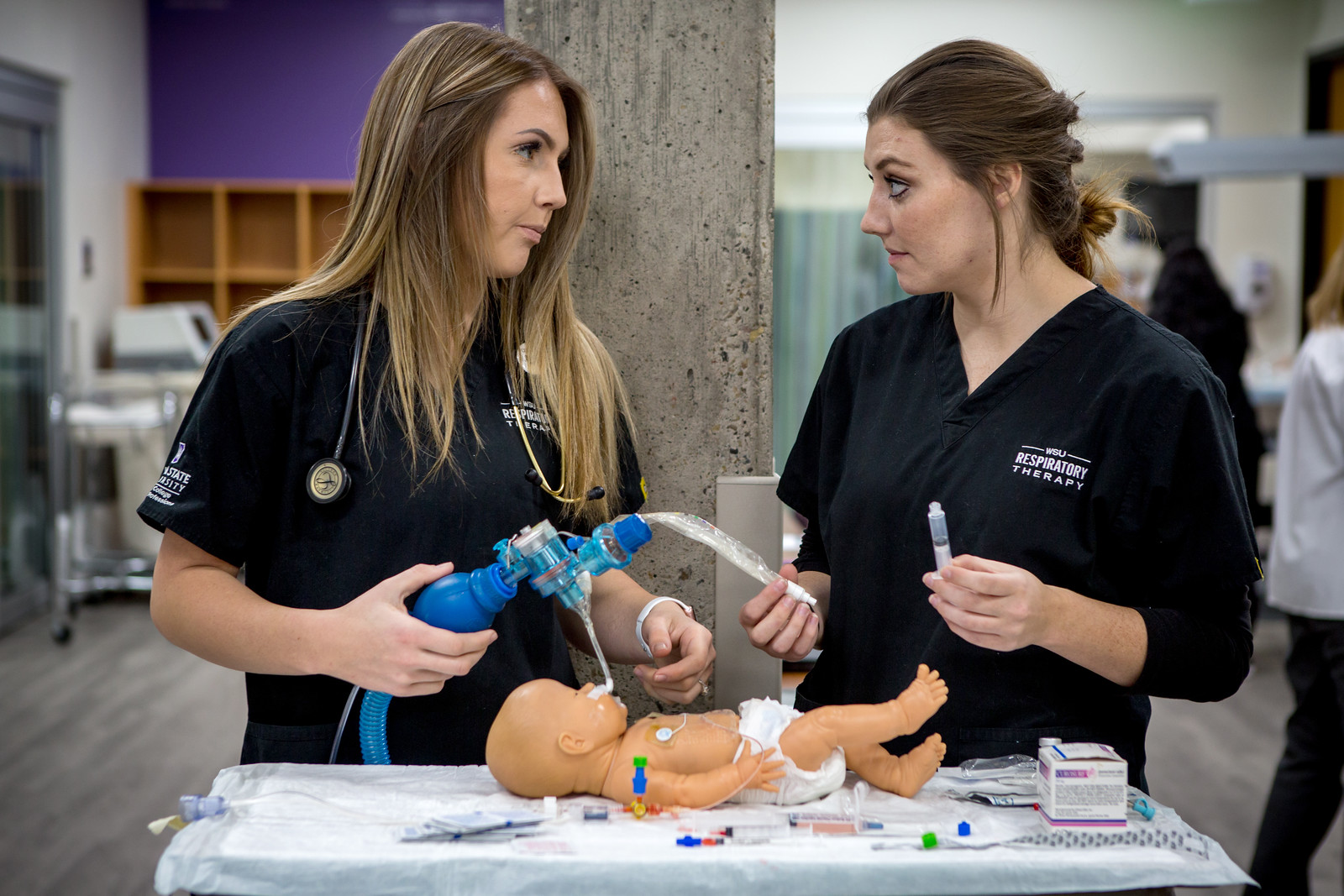2024-25 Catalog ARCHIVED CATALOG: Content may no longer be accurate.
Department of Respiratory Therapy
|
|
 Return to: Dr. Ezekiel R. Dumke College of Health Professions Return to: Dr. Ezekiel R. Dumke College of Health Professions

Department Chair: Mich Oki
Medical Director: Roger Paulman, M.D.
Location: Marriott Allied Health Building, Rm 309
Telephone Contact: Irma Marroquin-Lewis (801) 626-7071Professor: Paul Eberle; Associate Professor: Mich Oki; Assistant Professors: Sarah Allred, Sharri Vasas; Instructor:
 Respiratory care professionals are actively involved, as members of the health care team, in the diagnosis, treatment, management, education, and long-term care of patients with cardiopulmonary problems. These patients may be in the newborn nursery, surgical/medical/rehabilitation units, outpatient clinics, Emergency Room, or cardiac/shock-trauma/burn/neurologic intensive care units. Respiratory Care Practitioners [RCPs] are employed in both acute and long-term care hospitals, skilled nursing facilities, and home health agencies. Respiratory care professionals are actively involved, as members of the health care team, in the diagnosis, treatment, management, education, and long-term care of patients with cardiopulmonary problems. These patients may be in the newborn nursery, surgical/medical/rehabilitation units, outpatient clinics, Emergency Room, or cardiac/shock-trauma/burn/neurologic intensive care units. Respiratory Care Practitioners [RCPs] are employed in both acute and long-term care hospitals, skilled nursing facilities, and home health agencies.
Licensed RCPs perform therapeutic and diagnostic procedures under the direction of a physician. Respiratory care practitioners are competent in basic patient care and assessment, medical gas administration, aerosol and humidity therapy, medication administration, hyperinflation techniques, bronchopulmonary drainage and percussion, mechanical ventilation, airway management, advanced cardiac life support, pulmonary function studies, and blood gas sampling and analysis. Patient education, smoking cessation/nicotine intervention, and health promotion are also included in the RCP scope of practice.
The respiratory therapy program follows a career-ladder approach from the pre-professional level through a Bachelor of Science degree. The pre-professional level requires two academic years, leads to an Associate of Applied Science degree, and qualifies the student for the Respiratory Therapy Bachelor of Science program providing eligibility to national credentialing and licensure to practice respiratory care (RCP). Acceptance to the pre-professional level requires program completion through the Bachelor of Science degree level.
Licensure
Applicants who have been convicted of a felony, treated for serious mental illness or substance abuse should discuss their eligibility status with the Utah Department of Professional Licensing. Acceptance to the respiratory therapy program does not assure eligibility for a RCP license. The Utah Department of Professional Licensing makes final decisions on issuance of professional licensure. Any student that is convicted of a felony will be dismissed from the program.
Accreditation
The Respiratory Therapy Program is accredited by the Commission on Accreditation for Respiratory Care (CoARC), P.O. Box 54876 Hurst,Texas 76054-4876.
To fulfill its mission, the department sets the following goals for graduates of the program: 1) To prepare graduates with demonstrated competence in the cognitive (knowledge), psychomotor (skills), and affective (behavior) learning domains of respiratory care practice as performed by registered respiratory therapists (RRTs) and,
2) to prepare leaders for the field of respiratory care by including curricular content that includes objectives related to acquisition of skills in one or more of the following: management, education, research, advanced clinical practice (which may include an area of clinical specialization). Program credentialing, attrition, and on-time graduation outcomes may be reviewed at the following site: https://coarc.com/getattachment/Students/Programmatic-Outcome-Data/2017-RCS-Program-Outcomes.pdf.aspx?lang=en-US
Courses
Respiratory Therapy Course Descriptions
ProgramsAssociate of Applied ScienceBachelor of ScienceEmphasis Option for Bachelor of Interdisciplinary Studies
BIS emphases are also offered for most programs with a minor.
 Return to: Dr. Ezekiel R. Dumke College of Health Professions Return to: Dr. Ezekiel R. Dumke College of Health Professions
|